From helping found the Atlanta Black-Jewish Coalition to protesting for the release of Soviet Jews, the US civil rights icon was a powerful friend of the Jewish community
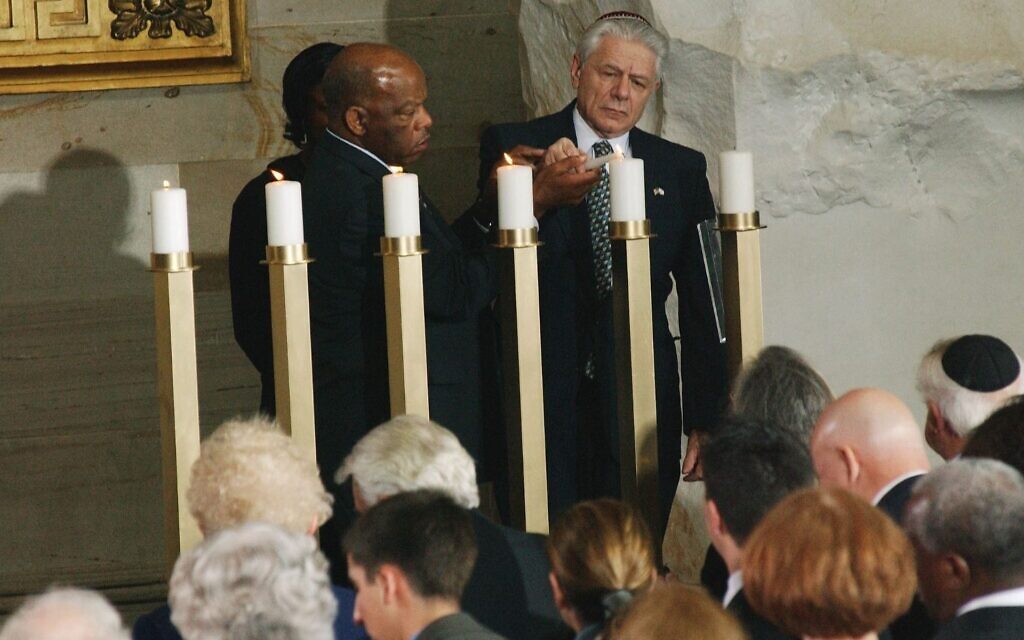
WASHINGTON (JTA) — When John Lewis, the civil rights icon and congressman from Georgia, died at 80 over the weekend, Jews in America and abroad lost an ally of nearly six decades.
Lewis never tired of telling folks to “get into good trouble,” to defy the authorities and the conventional wisdom. It was a creed that guided him as he helped organize the 1963 March on Washington; that led to police severely beating him in Selma, Alabama, in 1965; and that underscored his 33-year career in Congress.
He also had a close relationship with the Jewish community dating to the 1960s, fortified by alliances he forged throughout his congressional career. Many Jewish leaders on both sides of the aisle lauded Lewis when he announced his cancer diagnosis last year and mourned him this week.
Here are six Jewish moments from Lewis’ long and storied career working toward justice in America.
Praying with his feet
That Selma March? It started with 12 men and women joining arms and leading others across the Edmund Pettus Bridge. Among those 12 were Martin Luther King, Jr. and Rabbi Abraham Joshua Heschel. The rabbi was asked after the march whether he found time to pray. Heschel famously answered: “I prayed with my feet.” Lewis, then 25, was right alongside them.
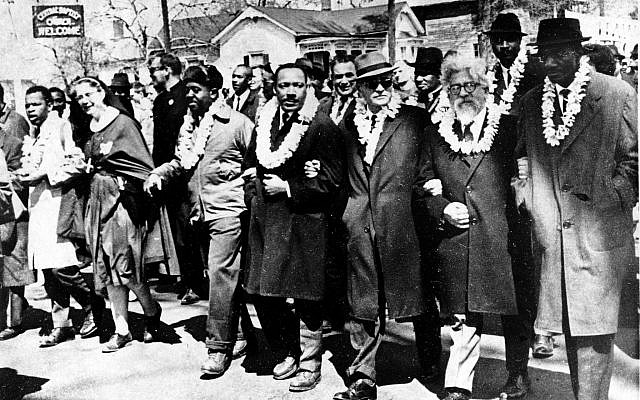
Coalition-building
There’s a narrative that the unity that defined the Black-Jewish alliance in the 1960s dissipated by the 1980s, in part because Black leaders like Andrew Young and Jesse Jackson vocally embraced advocacy for Palestinians.
If that was the narrative, Lewis did not seem to be reading the book. In 1982, he worked with the American Jewish Committee to found the Atlanta Black-Jewish Coalition. It was an alliance that culminated in 2019 in the founding last year of the Congressional Black-Jewish Caucus.
Let my people(s) go
Jews have been hesitant at times to link Jewish suffering with that of African Americans. Lewis was not. At a mass Washington demonstration in 1987 calling for the liberation of Soviet Jewry, Lewis did not hesitate to make the connection.
“I stand here not so much as a member of Congress but I stand here as a human being,” Lewis said. “Almost 25 years ago I participated in a march here for jobs and freedom. Hundreds and thousands of members of the Jewish community marched with us then. I think it’s fitting for me to be with you today.
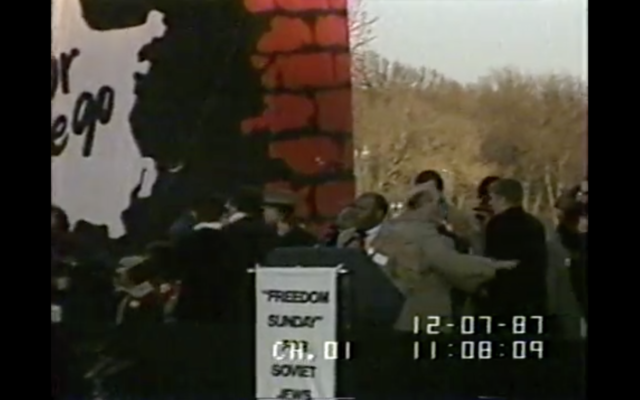
“Our message, the message of the Black community, is one that is very simple. We are saying to President Reagan, Mr. President, tell Mr. Gorbachev to open the doors, open the gates and let the people out. I said that as long as one Jew is denied the right to emigrate, as long as one Jew is denied the right to be Jewish in the Soviet Union, we all are Jews in the Soviet Union.”
Spurning Farrakhan
In 1995, Nation of Islam founder Louis Farrakhan set out to convene Black men in Washington, D.C., at a rally meant to extend the symbolism of the 1963 March on Washington.
Some prominent figures from the civil rights movement attended the Million Man March on Washington, including Rosa Parks, but Lewis said he would not because of Farrakhan’s track record, which then as now included anti-Semitic comments.
“I cannot overlook past statements by Louis Farrakhan — and others associated with the Nation of Islam — which are divisive and bigoted,” Lewis told Newsweek at the time. “Although its general goal of encouraging African American men to be responsible is sound, the march is fatally undermined by its chief sponsor.”
Boycotting Bibi but supporting Israel
Israeli Prime Minister Benjamin Netanyahu in 2015 accepted an invitation from then-US House of Representatives Speaker John Boehner, a Republican, to speak in Congress against President Barack Obama’s Iran policies.
Boehner, who had not consulted with Democrats in Congress or the White House about the invitation, framed Netanyahu’s speech as a more serious take on Iran, and members of the Congressional Black Caucus saw it as an all-too-familiar dis: The white man was pushing the Black man out of the limelight.
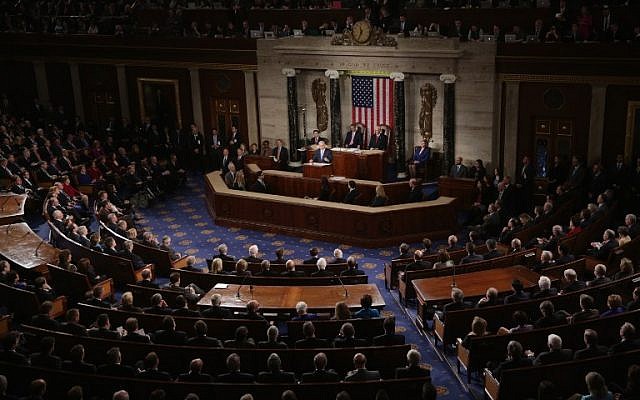
Pro-Israel groups and figures also had been caught by surprise by the invitation; nonetheless, the prospect of a boycott appalled them, and they set about trying to persuade Democrats to turn up. Lewis would not have it — but he emphasized his support for Israel in his decision not to attend the speech.
“I am saddened that the speaker would threaten this historic position, bipartisan support of our Israeli brothers and sisters, by this action,” he said.
Israeli officials joined the chorus of worldwide leaders mourning Lewis this week. “The US lost a hero. Israel lost a friend,” tweeted Dani Dayan, the outgoing consul general of Israel in New York, along with a picture of a 2015 tweet from Lewis himself saying, “I don’t take a backseat to anyone in my commitment and support of Israel.”
Opposing BDS while backing the right to boycott
Lewis was opposed to the movement to boycott Israel, but — his thoughts cast back to the business boycotts that helped propel the civil rights movement — he was fiercely defensive of the right to boycott.
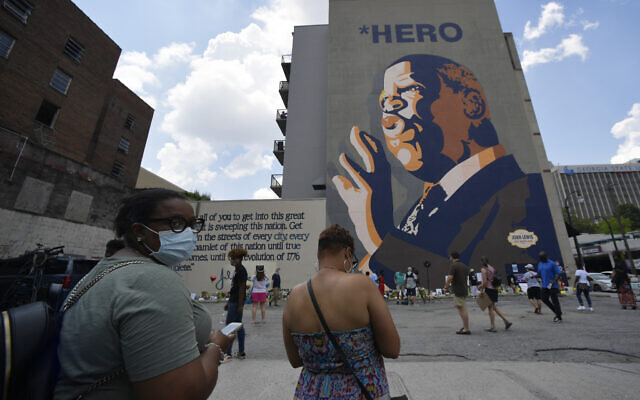
He opposed state laws and proposed federal laws that would penalize boycotters and joined two freshmen congresswomen who back the movement to boycott, divest and sanction Israel in sponsoring a resolution affirming the right of Americans to boycott, a resolution centrist pro-Israel groups lobbied against.
Co-sponsoring the resolution was “a simple demonstration of my ongoing commitment to the ability of every American to exercise the fundamental First Amendment right to protest through nonviolent actions,” he said at the time.
“I want to make it very clear that I disagree strongly with the BDS movement,” Lewis said in the same statement. He put his words in action, co-sponsoring a resolution that condemned but did not penalize the BDS movement.
As reported by The Times of Israel
